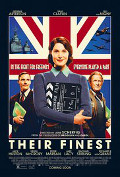
Directed by
Lone Scherfig
117 minutes
Rated M
Reviewed by
Bernard Hemingway

Their Finest
Synopsis: London during the Blitz and a young married woman, Mrs Catrin Cole (Gemma Arterton) is hired by the Ministry of Information’s Film Division to bring a female perspective to the propaganda shorts it makes. It is a job that will change her life when she finds herself working as a scriptwriter for a patriotic feature film.
Based on Lissa Evans’ 2009 novel “Their Finest Hour and a Half” and empathetically transposed to the screen by Lone Scherfig Their Finest trades heavily on nostalgia. Not for the period as such but rather for the staunchly British, morale-boosting films made at the time that were purposely designed to aid the war effort. films that many of us in Australia would have seen in the 1950s when culturally we were still being suckled by the Mother Country. If you can bring that personal history to the film it should provide many pleasures.
As a production the film carefully re-creates the drab look of the period shooting in dimly-lit offices, cramped digs and smoky saloon bars with a palette of subdued blacks, greys, maroon, brown and olive green. When, late in film, the crew move to Devon to shoot exteriors for their production the natural light almost hurts one's eyes and the sand dunes and tussocks of wild grass seem like an alien planet after the dreary dowdiness of the London interiors.
Against this cheerless backdrop Gemma Arterton radiates an earthy sensuality, her sensible clothes notwithstanding, only her bright red lipstick visibly suggesting the yearnings within the dutiful Mrs Cole. Not that her prickly colleague Buckley (Sam Claflin) is oblivious to her charms, the progress of their very British Brief Encounter-ish relationship interwoven with the development of the film they are making and forming the substance of the story which also has, somewhat shoe-horned in, a sub-theme concerning the ground-breaking changes in the status of women due to the war.
Romance and women's liberation aside, there is much fun to be had from the public school types that pepper the film. Richard E. Grant appears as Mrs Cole’s mustachioed supervisor and Jeremy Irons has a droll cameo as a War Office chief who to set the mood recites Shakespeare’s St. Crispin's Day speech from "Henry V". It is however, the "awfully good" Bill Nighy as a dapperly narcissistic over-the-hill thespian, Ambrose Hilliard, who provides the lion’s share of the fun.
Not all is perfect however. There is a repeated exchange between Buckley and Mrs Cole in which he criticizes her tendency to write too much dialogue and instructs her to “lose half of it”. “Which half”” she replies. “The half you don’t need” he retorts. Gaby Chiappe’s screenplay needn’t have been so drastically cut but the final section in which Mrs Cole is given a second blow to her morale is a misjudgement (and, compounding matters, it is not even particularly well done), forcing the film to run another fifteen minutes or so in order to get her back to more or less where she was before the disappointment. It is fifteen minutes that add nothing significant and without it, the film might have been close to perfect. Not as good perhaps as Scherfig’s 2009 dip into Britannia''s relatively recent past, An Education, but as an exercise in style still quite marvellous.
Shortcomings aside, for baby boomers at least, The Finest should provide as much fun at the pictures as you’re likely to have in a good long while.

Want more about this film?


Want something different?




